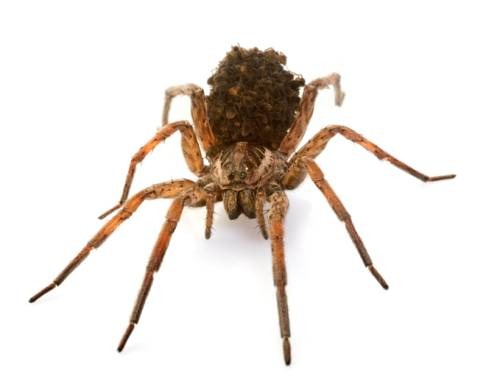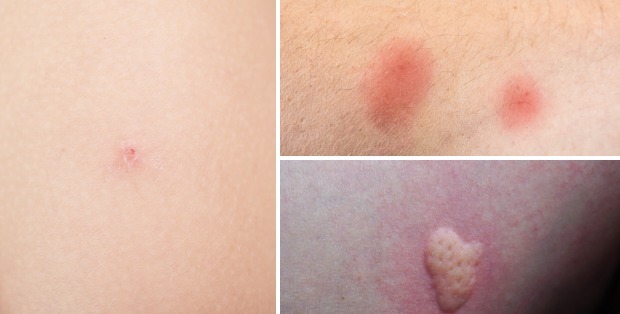Wolf Spider Bite: Symptoms and Natural Treatments

A wolf spider is half to two-inch long spider commonly found in the United States. Scientists have identified more than 125 species of wolf spiders in the U.S. alone.
Wolf spider bite can cause a lot of discomforts. Usually, a wolf spider bite is not deadly. However, it can be very painful, and can sometimes cause allergies.
It’s important to seek proper treatment for the bite to avoid the symptoms getting worse.
This article discusses the common symptoms and natural treatments for wolf spider bites. Before starting, let’s see some important facts about wolf spiders.
Where Do Wolf Spiders Live? How to Identify Them?
Wolf spiders are found where they find insects to feed on.
They can be a common pest in the fall most commonly found around doors, windows, house plants, while sometimes lingering around basements and garages.

A wolf spider is recognized by the two prominent eyes on its head which the other common spiders do not have.
However, they do not build webs and prefer to live and hunt alone. The wolf spider is hairy with splotches and striped colors of orange, brown, gray, and black.
It has two tiny legs extending from the front in addition to the eight legs.
Wolf spiders have large fangs that they use to bite their prey – mostly insects. According to the University of Kentucky, wolf spiders will only bite humans when they feel threatened or handled.
The good news is that a wolf spider bite is not poisonous and is typically treated as if it were a bee sting. A wolf spider bite can be distinguished from other insect bites that it looks like pin pricks.
Are wolf spiders venomous? Yes, wolf spider bite is venomous, but it is not fatal. If you are allergic, you can have serious complications – though this is quite rare.
Also Read: Yellow Jacket Stings: Symptoms, Reactions, Home Remedies & Prevention Tips
Symptoms Associated with a Wolf Spider Bite
What happens when a wolf spider bites you?
The symptoms of wolf spider bite are similar to that of a bee sting. You may experience the following symptoms when a wolf spider bites you:

The symptoms of a wolf spider bite can become dangerous in the event of an allergic reaction. If you experience any of the following, seek emergency medical attention:
- Severe itchiness
- Nausea
- Dizziness, or a rapid pulse
Some may also experience swelling of lymph glands.
What’s Different Between Wolf Spider and Brown Recluse Spider Bites?
Both are quite similar in shape and size, though brown recluse spiders are thinner and less hairy than wolf spiders. A brown recluse bite is much more serious and should be treated immediately.
If possible, you should try to identify the spider and ensure if it is a wolf spider bite.

The brown recluse will cause severe pain, itching, vomiting, and muscle cramps. If the bite is not treated properly, you may notice blistering, scarring, and tissue death around the affected area.
How Do You Treat a Wolf Spider Bite?
Wolf spider bites are often easily treatable with home remedies that can provide relief to the affected area.
There are many alternatives to medicine which reduce swelling, itching, and pain. These alternatives include healthier natural ingredients.

Steps to Treat A Wolf Spider Bite:
- Wash hands with antibacterial soap and warm water before attending to the bite.
- Apply a cold towel or pack to reduce the inflammation and minimize the chance of spreading the venom.
- Evaluate the bite: Are the symptoms improving, getting worse or are they staying the same?
- Apply one of the over the counter medicines or natural ingredients such as apple cider vinegar, witch hazel, honey, cold compress, baking soda, or chamomile.
If your pain or swelling is overwhelming, you can use over the counter antihistamines for swelling and acetaminophen for pain. Natural remedies work much better and are safe, too.
Also Read: How To Treat Horsefly Bites
Home Remedies to Help Treat Wolf Spider Bite
There are some easy home remedies that can help you treat the symptoms of wolf spider bites. Let’s see.
1. Cold Compress

Apply a cold compress to the area surrounding the bite can help you reduce the pain and discomfort. If you are using an ice pack, be sure to wrap it in a towel to avoid skin irritation or burning.
A cold compress works by suppressing the blood cells and slowing the blood rushing to the wound which can minimize the chances of the bite spreading.
- Use an ice pack or put ice in a bag and cover with a towel
- Apply the ice pack directly to your wound to ease the pain and reduce any swelling or inflammation in the area
- Continue to apply to the affected area for 15-20 minutes every hour to reduce discomfort and pain from the wolf spider bite
2. Baking Soda

Baking soda can help you ensure the wolf spider bite remains infection free and does not damage the surrounding tissues.
Anti-inflammatory properties of baking soda help reduce the redness and itching around the area. Baking soda is perfectly safe and a good home remedy for bee stings and any other insect bites.
- Start by making a paste of one tablespoon of baking soda with a little water at a time, mixing until you get a thick paste
- Apply directly to the bite and let it sit for 10-15 minutes
- Rinse the area with water
- This can be done multiple times a day to relieve the wolf spider bite symptoms
Also Read: 10 Health Benefits of Baking Soda Bath
3. Apple Cider Vinegar

Apple cider vinegar has been around for quite a long time and is very well known for its incredible healing abilities.
The acidic properties of raw apple cider vinegar help eliminate itching and inflammation from a wolf spider bite. The acetic acid in apple cider vinegar acts as a topical antibacterial and helps prevent the spread of infection.
- Mix equal parts of raw apple cider vinegar with water to dilute the vinegar
- Use either a cotton ball or disposable cloth. Dip it directly in the liquid and apply to the wolf spider bite
- Leave it to dry and then rinse with warm water
- Applying apple cider vinegar two to three times per day will help the bite heal quicker
4. Witch Hazel

Witch hazel is a natural anti-inflammatory medicine. It is the best home remedy to get rid of wolf spider bite symptoms.
Witch hazel contains tannins which constrict tissues in the skin and protects the wounded area. You can also use witch hazel as a natural acne treatment for your face or body.
- Soak a piece of tissue, paper towel, or cotton ball in pure witch hazel
- Lightly dab the affected skin area for up to 10-15 minutes allowing the tannins to soak into the wolf spider bite
- This can be done twice per day to reduce symptoms of a wolf spider bite
5. Honey

Honey is known to have a myriad of health benefits including being able to help reduce skin inflammation around a wolf spider bite. Due to the antibacterial properties, honey can help heal wounds, especially those that require sterilization.
Apply little honey few times a day to heal the wolf spider bite. Be sure to use raw, organic, unprocessed honey.
6. Chamomile

Essential oils are another great way to treat a wolf spider bite. Chamomile well known for its relaxing power also helps treat wolf spider bite.
- Add two to three drops of chamomile essential oil to a coconut oil or other carrier oil
- Apply the remedy to the wolf spider bite and the surrounding area by gently massaging it into your skin
- Use two to three times a day to keep your skin infection free and heal the wolf spider bite.
7. Antihistamines and Acetaminophen

Antihistamines are an alternative if the symptoms like swelling or itching are persistent through the application of natural remedies. Keep in mind this should be considered as a last resort and should be taken with caution.
Acetaminophen can be taken in case of a severe bite which makes the pain unbearable. You should consider seeing a doctor for further evaluation.
How to Get Rid of Wolf Spiders?
Since wolf spiders are solitary creatures, it is unlikely they would infest homes as other insects and bugs would. You should take precaution and try to get rid of the wolf spiders that may be in your home.
The best way to get rid of wolf spiders is to create your own spider repellent which will not harm your family, home, or pets.
Take a spray bottle and fill it with water.
Add a little dish soap and few drops of essential oil as described above to spider-proof your home. You can use either of mint, neem, cinnamon, or citronella oil. This remedy can be sprayed on areas of your home where you think spiders may persist.
When to See a Doctor?
A wolf spider bite will not do long-term damage, but other spiders can such as a black widow or brown recluse. If you are unsure of the type of spider bite you have, always take precautions and see your doctor immediately for wolf spider bite treatment.
You should head to a doctor immediately if you notice any of the following symptoms. These symptoms indicate a reaction to the venom:
- Nausea or vomiting
- Skin rash
- Pain worsens and spreads to back, abdomen, or chest
- Trouble breathing
- Fever with chills
- Abdominal cramps
If your symptoms don’t improve after 7-10 days see a doctor to evaluate your bite.
Sources:
“Wolf Spider Bites,” ORKIN web site; https://www.orkin.com/other/spiders/wolf-spiders/bites/, last accessed Aug 20, 2017
Campbell DS, Rees RS, King LE. “Wolf spider bites”. Cutis. 1987 Feb;39(2):113-4.
https://www.ncbi.nlm.nih.gov/pubmed/3829717
“Identification and Treatment of a Wolf Spider Bite,” Healdove web site; https://healdove.com/first-aid/wolf-spider-bite, last accessed Aug 20, 2017
Sharing is caring! Your love and support motivates us!
